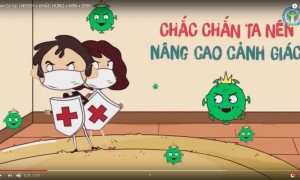我完成了 I’m done
(X) I’m over.
Over 可以翻作「结束,完毕」,但如果说 I’m over.,听起来会像是说「我结束了,我完蛋了」。所以说,如果要表达自己已经把工作完成时,要用 I’m done. 会比较贴切。 Done 在这边是形容词,表示事情完成了或是某人做完某件事情,主词可以是人或事。若想明确地说出自己完成了哪项工作,也可以用 I finished ____. 或是 I’m done with ____. 这样的句型。
Richard: Gregg, let me know if you need any help with that report. I know you’ve been under a lot of stress lately.
Richard:Gregg,如果你报告需要帮忙的话跟我说,我知道你最近压力很大。
Gregg: No need; I’m already done!
Gregg:不需要,我已经完成了!
Richard: Really? Wow! Can I have a look?
Richard:真的吗?哇!我可以看看吗?
Gregg: Sure! I’ve already made bound copies.
Gregg:好呀,我已经列印成册了。
Richard: Gregg, it’s almost 300 pages! How did you get it done so fast?
Richard:Gregg,这快 300 页了耶!你怎么这么快弄好的?
Gregg: I’ve been doing a lot of overtime.
Gregg:我加了很多班。
Richard: (pages through the report) But Gregg, most of these pages are blank!
Richard:(翻阅报告) 但是 Gregg,多数页面都是空白的耶!
工作量很大 heavy workload
(X) big loading
把「大」直接翻作 big 是非英文母语者很常见的问题,就像「大雨」很常听到有人说成 big rain 。但当事物是由「量」来计算时,形容词应该选用 heavy 而非 big。 Heavy 常见搭配用法包括 heavy rain(大雨)、heavy duty(重责)以及这里谈到的 heavy workload(很大的工作量),动词可以搭配 carry(承担)或是 have。
Susie: And so it was just 300 pages of nothing?
Susie:所以 300 页什么都没有?
Richard: Well… there was a title page. And he’d had the reports professionally bound. But everything else was blank.
Richard:这个嘛… 有书名页。而且他还专业地把把报告集成册了,但其它地方都是空白的。
Susie: I know he’s been carrying a really heavy workload recently.
Susie:我知道他最近工作量很大。
Richard: Exactly. I think the workload has finally pushed him over the edge. I’m a bit concerned about his mental state.
Richard:没错,我想工作量最终还是把他逼到绝境了。我有点担心他的精神状态。
Susie: Now that you mention it, last week, I did see him using a banana as a cell phone. I’ll go speak to him.
Susie:既然你提到了,我上周的确是看到把香蕉手机用。我会去跟他谈谈。

降低成本 lower cost(s)
(X) cost down
开会中常常听到老板说要 cost down ,但其实这个说法是不对的。 Cost down 是中文的直译,并不是道地的英文用法喔!如果提到「降低成本」,正确的说法为 lower cost(s),lower 在这边是当动词用,表示「降低,减少」。
Richard: Well? Did you talk to him?
Richard:怎么样?你跟他谈过了吗?
Susie: I think this is quite serious. Gregg seems to have gone completely insane.
Susie:我觉得这蛮严重的,Gregg 似乎已经彻底疯了。
Richard: What happened?
Richard:发生什么事了?
Susie: Yesterday I dropped by his cubicle to try and have a chat about how he’s doing.
Susie:昨天我经过他的座位,尝试跟他聊了一下他的近况。
Richard: And?
Richard:然后呢?
Susie: He wanted to show me his “secret plans to lower costs in the company’s supply chain”, but his PowerPoint was just full of drawings he’d done of cats.
Susie:他想要给我看他「降低公司供应链成本的秘密计画」,但他的 PPT 却全都是他画的猫。
拨打我的手机 call me on my cell (phone)
(X) You can call my cell phone.
这句话也是因为直翻而产生的错误,讲出来会让外国人一头雾水的! Call my cell phone 意思会变成「打电话给『我的手机』」,而不是「打电话给『我』」,所以务必要记得加上介系词 on 再接 my cell (phone),才会是「你可以打电话到我的手机找我」的意思。
Richard: Gregg? Have you got five minutes?
Richard:Gregg,你有 5 分钟的时间吗?
Gregg: Sorry, Richard, I’m just working on a plan to lower costs in the company’s supply chain.
Gregg:不好意思,Richard,我正在处理降低公司供应链成本的计画。
Richard: Gregg… I can see that you’re just drawing pictures of cats.
Richard:Gregg… 我可以看到你只是在画猫咪的图案。
Gregg: Sorry, Richard, if you need me, you can always call me on my cell phone. Oh, looks like I’m getting a call right now! Hello?
Gregg:抱歉,Richard,如果你需要我的话,可以随时打我手机。喔,看来我现在有电话进来了!喂?
Richard: Gregg, that’s a banana! Let me speak to the boss about getting you a holiday.
Richard:Gregg,那是根香蕉!让我跟老板谈谈,让你放个假吧。
请再说一次 What was that? / I’m sorry? / Pardon?
(X) Please repeat again.
别人说的话没有在第一次听清楚是人之常情,这个时候再请对方再说一遍就好。然而常听到的 Please repeat again. 其实是不自然的说法, 而且 repeat 本身就有重复的意思了,所以后面就不用多此一举再加一个 again 。道地的说法可以用 (I beg your) Pardon?、I’m sorry?、What was that?,或是直接说 Can you please repeat that?,记得句尾语调要上扬才能表示疑问。
Richard: I was wondering if we could have a chat about Gregg…
Richard:我在想我们是不是能聊聊 Gregg…
Theresa: Gregg? No need to ask, I’ve already given him a promotion and a raise.
Theresa:Gregg 吗?不用问了,我已经帮他升职加薪了。
Richard: Wait… what was that?
Richard:等等… 你说什么?
Theresa: Gregg is showing the exact type of innovative thinking that we need to become number one in the industry.
Theresa:Gregg 展现了我们成为产业龙头所需要的创新思考精神。
Richard: I beg your pardon?
Richard:你说什么?
Theresa: I’ve asked him to give a presentation to the Board of Directors tomorrow on his secret plan to lower costs in our supply chain.
Theresa:我已经请他明天针对他降低产业链成本的计画项董事会提交报告了。
投影片 slide
(X) PPT
想必大家对 PPT 这个说词都不陌生,不管上学还是上班,PPT 都是报告的必备工具。但注意了! PPT 其实是台湾人对 PowerPoint 这个软体独有的简称,在英语世界里并没有这样的说法。 PowerPoint 中的投影片正确说法是 slide ,多张投影片则加上 -s 变成 slides,而投影片报告则是 PowerPoint presentation,不要再说错啦!
Susie: Did you speak to Theresa?
Susie:你和 Theresa 聊过了吗?
Richard: She’s given Gregg his own office and made him an executive.
Richard:她给了 Gregg 个人办公室,还把他升为高阶主管。
Susie: I’m sorry?
Susie:你说什么?
Richard: Theresa is convinced that Gregg is some sort of genius. She’s asked him to show his PowerPoint presentation to the Board tomorrow.
Richard:Theresa 坚信 Gregg 是某种天才,还请他明天向董事会展示他的 PPT!
Susie: What? The one with all the slides of cat drawings?
Susie:什么?那个全都是猫咪投影片的报告?
谢谢聆听 Thanks for listening. / Thank you for listening.
(X) Thank you for your listening.
从小到大听到的 Thank you for your listening. 其实是中式英文喔!事实上,your 后面只能接上「事物」,不能接上「动作」,所以如果表达「感谢『你的』聆听」,只要说 Thanks for listening. 或 Thank you for listening. 就可以了。同理,「感谢你的收看」则可以说 Thanks for watching. 。
Gregg: So, in conclusion, I want you to ask yourself this: Can rabbits even speak Italian?
Gregg:所以总结来说,我想请你们问自己一个问题:兔子会说义大利文吗?
Board member: I’m sorry, what was that?
董事会成员:你说什么?
Gregg: Yes. Thanks for listening.
Gregg:好的,谢谢聆听。
Board member: Oh… I think I see what you’re saying. We need to speak with our customers, not at them.
董事会成员:喔… 我懂你在说什么了。我们要和我们的客户对话,不是向着他们说话。
Gregg: (winks) Thank you for listening.
Gregg:(眨眼)谢谢各位聆听。
Board member: Theresa, this is one smart man. You do whatever you can to keep him at the company.
董事会成员:Theresa,这小子真聪明,务必要尽一切可能把他留在公司。
我的意思是 _____ What I mean is, _____.
(X) My meaning is _____.
中文说「我的意思」,很多人会直翻成 my meaning。这句话文法上没有错,meaning 是名词,确实可以表示「意思」,但是不会说 my meaning、your meaning,道地的说法是 what I mean。所以当你要解释自己所说的话时,可以用 what I mean is, 后面加上一个子句,mean 在这边则是动词,表示「意思是」。
Richard: So, after 20 minutes of nonsense and slides of cats, he just winked and said, “Thanks for listening.”
Richard:结果经过 20 分钟的胡言乱语和一堆猫咪投影片后,他只是眨眼然后说「谢谢聆听」。
Susie: And what did the Board think?
Susie:那董事会觉得如何?
Richard: They loved it! They gave him a standing ovation! One of them called him “the next Steve Jobs”.
Richard:他们爱死了!还起立鼓掌!其中一个人还称他为「下一个贾伯斯」。
Susie: Maybe this is all deliberate? What I mean is, he knows it’s the exact kind of “innovative” bullshit that the people who run this company love.
Susie:或许这全都是故意的?我的意思是,他知道经营这间公司的人就爱这种「创新」的垃圾。
Richard: Yes. And by tricking them into thinking he’s a genius, he can get rid of his heavy workload.
Richard:没错,而且只要骗他们相信自己是天才,他就可以摆脱沉重的工作量了。
Susie: They do say there’s a fine line between genius and insanity.
Susie:人们的确是说到天才和疯子只有一线之隔。







